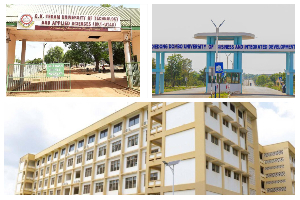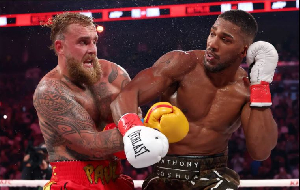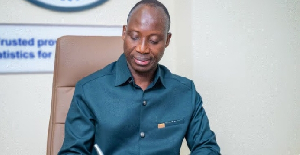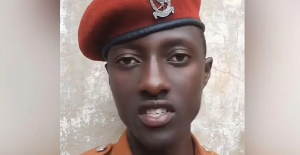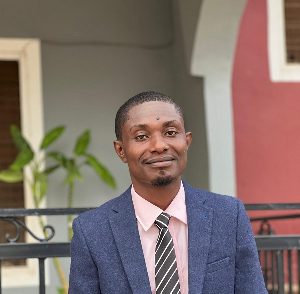By Kwadwo Amoako
Ø ³Embattled NDC National Gen. Sec. and Chairman unleash national Vote Suppression Scheme against angry NDC Foot Soldiers in violation Political Parties Law (Act 574, 2000), 1992 Constitution and NDC Constitution²
Ø ³Dr Kwabena Adjei imposes his wife as unopposed chairman on Akropong Constituency²
Ø ³Adjei and Nketia violate NDC Constitution by forming Œcommon slate of candidates¹ to introduce factionalism²
Ø ³Adjei and Nketia attempted last minute illegal maneuvers to bar Spio; E/R Vice Chairman; stop London Congress etc²
Ø ³Gen. Mosquito threatens to dismantle 31 Dec. Women¹s Movement & Expel Founder²
Ø ³NDC Lawyers for Justice to Petition Atty. General & NDC National Executive Committee to take action before National Congress on January 15²
Embattled NDC Chairman Dr Kwabena Adjei and NDC General Secretary Asiedu Nketia in a last ditch effort to maintain top party positions after losing the trust of the majority of foot soldiers, the rank and file of the NDC and the Founder Flight Lieutenant Jerry John Rawlings have resorted to ³vote suppression² conspiracy in criminal violation of Ghana¹s Political Parties Law (Act 574, 2000).[1] <#_ftn1>
In addition Adjei and Nketia have launched various vote suppression and intimidatory tactics in violation of the 1992 Constitution, The UN¹s Universal Declaration of Human Rights and the African Union¹s (Banjul Charter) Declaration of Human Rights.
By working in syndication with regional ministers and district chief executives who are government appointees to lobby, influence and in some places such as recently in the Eastern, Ashanti, Western, Greater Accra and Volta NDC regional conferences ³suppress² the anti-incumbent votes, both Dr Adjei and Mr. Nketia (who regularly sit in Cabinet meetings to formulate government policy) are violating the political rights of ordinary NDC members guaranteed by the 1992 Constitution.
Article (1) (4) urges all Ghanaians and NDC members to Defend the Constitution.[2] <#_ftn2> Article 12 (1); 14 (1); 17 (1, 2, 3); 18 (2) [3] <#_ftn3> guarantees the fundamental human rights of NDC foot soldiers the right to hold contrary political opinions and to communicate them and be not discriminated against solely on that basis as guaranteed by either the government or its senior ministers (such as regular Cabinet members and attendees Adjei and Nketia).
Articles 21 (1 3) of the 1992 Constitution guarantees the freedom of speech,[4] <#_ftn4> freedom of association and freedom of information rights of disgruntled NDC foot soldiers who are opposed to the re-election of Dr Adjei and Nketia. As formal leaders of the NDC their actions are also subject to the rigours of Ghanaian law. All political parties in Ghana are mere instrumentalities of the 1992 Constitution, they CAN NOT adopt internal bye-laws or regulations or procedures or take actions that violate the 1992 Constitution and are an affront to the Directive Principles of State Policy under Articles 35 (1); 35 (4) from adopting policies in violation of my fundamental human rights and freedoms. [5] <#_ftn5>
By using suppressive tactics to reduce the anti-incumbent/ anti-Adjei / anti-Nketia vote at the just ended regional NDC regional congresses, Dr Adjei and Mr. Nketia are violating the fundamental political right by EVERY citizen of Ghana to join a political party of their choice. Article 55 (2) guarantees the right of ³every citizen of Ghana of voting age has the right to join a political party²
Moreover the Constitution guarantees the right to ALL citizens to actively ³participate in political activity intended to influence the composition and policies of the Government.² Article 55 (10).[6] <#_ftn6> Yet while the 1992 Constitution allows the political parties to regulate their internal affairs, still observing that they are mere instrumentalities of the Constitution and are at all times subordinate to the Constitution forbids the NDC or any party from adopting procedures and rules that violate Œdemocratic principles or contravene or are inconsistent with the constitution.¹[7] <#_ftn7>
That by trying to threaten expulsion from the party of Dr Spio-Garbrah because he wrote a September 2009 article praising Dr Nkrumah and critical of the slow pace of the Atta-Mills government in a letter marked (NDC/HQ/14/01/385 and NDC/HG/14/01/373), both senior officers of the NDC, Adjei and Nketia violated Section 38 and 40 of the party¹s constitution and Article 162 (2) of the 1992 Constitutional which specifically states that ³there shall be no censorship in Ghana.²[8] <#_ftn8> Furthermore, by using their offices as Chairman and Gen. Secretary to harass the Founder, Spio-Garbrah, Hon. Afotey Agbo and Hon Tei Nyauyanyo for being critical of the government they violated the strictures of the 1992 Constitution which forbids ANY HARRASSMENT of writers in newspapers because of what they have written. Article 162 (4) of the Constitution says . . . institutions of the mass media shall not be subject to control or interference by Government, not shall they be penalized or harassed for their editorial opinions and views, or the content of their publications.²[9] <#_ftn9>
The preamble of the 1992 Constitution purports to be adopted to secure ³our natural and inalienable rights² and in solemn declaration and affirmation of the ³The Rule of Law² and ³fundamental Human Rights and Freedoms.²[10] <#_ftn10>
So what are these Œnatural, inalienable and fundamental human rights and freedoms¹ if the freedom of speech, thoughts and expressions is not one of them?? Does the NDC want to stand for the preposition that it is AGAINST THE FREEDOM OF THOUGHT, SPEECH AND EXPRESSION?? In an age when with the Internet and Telecommunications information is spread around the world at the speed of light is the NDC going to commit itself to the 18th century practice of having an Imprimatur who will review and censor EVERY STATEMENT, SPEECH and WORD uttered by ANY of its MILLIONS of supporters?
In violation of the NDC Constitution which in Article 6 recognizes Flight Lieutenant Jerry John Rawlings as the ³founder of the party Š upon whose vision and leadership the party was established,² Mr. Asiedu Nketia has made several disparaging remarks against the founder, intimating threats to expel or remove him from the party in violation of Article 6 of the NDC Constitution. Indeed Article 50 of the NDC Constitution recognizes the birthday of the Founder, June 22 as the Party¹s Founding Day celebration. Does the General Secretary not violate his duties under Article 27 to faithfully run the party and adhere to its Constitution by pouring scorn upon the Founder in violation of Articles 6 and 50?
In violation of Article 39 (6) Dr Adjei and Asiedu Nketia hastily and illegally hauled Ekwow Spio-Garbrah, Ato Ahwoi and Koku Anyidoho to the NDC Disciplinary Committee in disregard of Article 39 (6)[11] <#_ftn11> which says that the National Executive Committee and NOT the Functional Executive Committee charge errant members if they aren¹t so charged by their unit, ward, constituency, district or regional executives committees. Again, in order to achieve their purposes Dr Adjei and Nketia asked the disciplinary committee to sit within 30 days in disregard of Article 40 (4) of the NDC Constitution which says that of the NDC Constitution says that ³A DISCIPLINARY COMMITTEE SHALL WITHING 7 DAYS OF RECEIPTY OF A COMPLAINT COMVENE TO CONSIDER THE COMPLAINT.² Indeed even the 21 days grace period given by Article 40 (5) do not allow a case to commence after 30 days!!! Justice delayed is Justice Denied.
Indeed the VERY FIRST AIM of the NDC Party according to Article 7[12] <#_ftn12> of the NDC Constitution is not to win elections, but to ³promote PARTICIPATORY DEMOCRACY,² but Mr. Asiedu Nketia and Dr Adjei wish to extinguish it within the NDC.
Ghana as member of the United Nations and a signatory to the UN Charter on Human Rights and per the preamble of the 1992 Constitution and Article 11 (d) Ghana recognizes the UN Charter. And since the NDC is an instrumentality of the 1992 Constitution and can¹t promulgate rules contrary to it, it must also respect the Charter. However Mr. Nketia and Adjei¹s actions to suppress the vote and repress the political rights of foot soldiers in the party run afoul of Article 1, Article 18, Article 19, Article 20, Article 21 and Article 30.[13] <#_ftn13>
Just like the UN Declaration, Ghana¹s Constitution and the NDC Constitution, but also Article 9 and 13 of The African Union¹s Banjul Charter[14] <#_ftn14> recognizes the freedom of speech and press and movement of all the aggrieved NDC foot soldiers. Indeed not only does (cited below in footnote 19) the Banjul Charter reaffirm the rights as a citizen of Ghana, a member signatory to the Charter and a founding member of the AU, but Article 62 requires the government of Ghana (of which the NDC, our great party now leads) to provide periodic two-year reports on what it is doing to vindicate all our rights. It will be a great diplomatic farce if mere ordinary members of our great party are gagged, suppressed and punished for not supporting the reelection of Dr Adjei and Mr. Nketia.
I call upon the Attorney General to investigate these blatant violations of the Ghana Political Parties Law (Act 754) 2000 and warn Mr. Asiedu Nketia and Dr Kwabena Adjei for their illegal vote suppression activities.
Long live the NDC Long live President Atta-Mills Long live the Founder May the 1992 Constitution Endure!
kwadwo.amoakogh@gmail.com
[1] <#_ftnref> Ghana Political Parties Law (Act 574, 2000). Article 2.3 Any person who. (A). Suppresses or attempts to suppress the lawful political activity of another person contrary to subsection (1) or (B). Requires any person to join any particular political party contrary to subsection (2), commits an offence and shall on summary conviction be liable to a minimum fine of two million cedis or to imprisonment for a term not exceeding five years or to both.
<#_ftnref> [2] Article (1) (4) All citizens of Ghana shall have the right and duty at all times - (a) to defend this Constitution
<#_ftnref> [3] Article 12. 1) The fundamental human rights and freedoms enshrined in this Chapter shall be respected and upheld by the Executive, Legislature and Judiciary and all other organs of government and its agencies and, were applicable t them, by all natural and legal persons in Ghana, and shall be enforceable by the Courts as provided for in this Constitution.
Article 14. (1) Every person shall be entitled to his personal liberty and no person shall be deprived of his personal liberty except in the following cases and in accordance with procedure permitted by law
Article 17. (1) All persons shall be equal before the law 2) A person shall not be discriminated against on grounds of gender, race, colour, ethnic origin, religion, creed or social or economic status. (3) For the purposes of this article, "discriminate" means to give different treatment to different persons attributable only or mainly to their respective descriptions by race, place of origin, political opinions, colour, gender, occupation, religion or creed, whereby persons of one description are subjected to disabilities or restrictions to which persons of another description which are not granted of persons of another description are not made subject or are granted privileges or advantages which are not granted to persons of another description.
Article 18. (2) No person shall be subjected to interference with the privacy of his home, property, correspondence or communication except in accordance with law and as may be necessary in a free and democratic society for public safety or the economic well-being of the country, for the protection of the rights or freedoms of others
[4] <#_ftnref> Article 12 (1) All persons shall have the right to (a) freedom of speech and expression, which shall include freedom of the press and other media; (b) freedom of thought, conscience and belief, which shall include academic freedom;(c) freedom to practice any religion and to manifest such practice; (d) freedom of assembly including freedom to take part in processions and demonstrations. (e) freedom of association, which shall include freedom to form or join trade unions or other associations, national and international, for the protection of their interest; (f) information, subject to such qualifications and laws as are necessary in a democratic society; (g) freedom of movement which means the right to move freely in Ghana, the right to leave and to enter Ghana and immunity from expulsion from Ghana. (2 A restriction on a person's freedom of movement by his lawful detention shall not be held to be inconsistent with or in contravention of this article. (3) All citizens shall have the right and freedom to form or join political parties and to participate in political activities subject to such qualifications and law as are necessary in a free and democratic society and are consistent with this Constitution.
<#_ftnref>
[5] Article 35 (1) Ghana shall be a democratic state dedicated to the realization of freedom and justice; and accordingly, sovereignty resides in the people of Ghana from whom Government derives all its powers and authority through this Constitution. (4) The State shall cultivate among all Ghanaians respect for fundamental human rights and freedoms and the dignity of the human person.
<#_ftnref>
[6] Article 55 (10) Subject to the provisions of this constitution, every citizen of voting age has the right to participate in political activity intended to influence the composition and policies of the Government.
<#_ftnref>
[7] Article 55 (5) The internal organisation of a political party shall conform to democratic principles and its actions and purposes shall not contravene or be inconsistent with this constitution or any other law.
<#_ftnref>
[8] Article 162 (2) Subject to this Constitution and any other law not inconsistent with this Constitution, there shall be no censorship in Ghana.
[9] <#_ftnref> Article 162 (6) Any medium for the dissemination of information to the public which publishes a statement about or against any person shall be obliged to publish a rejoinder, if any, from the person in respect of whom the publication was made.
[10] <#_ftnref> 1992 Constitution Preamble: IN EXERCISE of our natural and inalienable right to establish a framework of government which shall secure for ourselves and posterity the blessing of liberty, equality of opportunity and prosperity; IN A SPIRIT of friendship and peace with all peoples of the world: AND IN SOLEMN declaration and affirmation of our commitment to; Freedom, Justice, probity and accountability; The principle that all powers of Government spring from the sovereign Will of the people; The Principle of Universal Adult Suffrage; The Rule of Law; The protection and preservation of fundamental Human Rights and Freedoms, Unity and Stability for our Nation DO HEREBY ADOPT, ENACT AND GIVE TO OURSELVES THIS CONSTITUTION
[11] <#_ftnref> NDC Constitution Article 39 (6) ³NOTWITHSTANDING PROVIVIONS OF ARTICLE 39 (1) OF THIS CONSTITUTION [which dictates how may discipline its members], THE NATIONAL DICIPLINARY COMMITTEE MAY ADJUDICATE UPON ANY MATTER REFERRED TO IT BY THE NATIONAL EXECUTIVE COMMITTEE²!! [[Emphasis added NOT the Functional Executive Committee]]
<#_ftnref>
[12] NDC Constitution Article 7 (Aims & Objectives) - 1(a) ³to promote participatory democracy and responsible government in Ghana.²
[13] <#_ftnref> UN Universal Declaration of Human Rights, December 10 1948 (Ghana became a member of the UN on 8th March 1957 and became a signatory to the UN Charter and the Declaration)
UN Human Rights Declaration Article 1 - All human beings are born free and equal in dignity and rights. They are endowed with reason and conscience and should act towards one another in a spirit of brotherhood.
UN Human Rights Declaration Article 18 - Everyone has the right to freedom of thought, conscience and religion; this right includes freedom to change his religion or belief, and freedom, either alone or in community with others and in public or private, to manifest his religion or belief in teaching, practice, worship and observance.
UN Human Rights Declaration Article 19 - Everyone has the right to freedom of opinion and expression; this right includes freedom to hold opinions without interference and to seek, receive and impart information and ideas through any media and regardless of frontiers.
UN Human Rights Declaration Article 20 - (1) Everyone has the right to freedom of peaceful assembly and association. (2) No one may be compelled to belong to an association.
UN Human Rights Declaration Article 21 - (1) Everyone has the right to take part in the government of his country, directly or through freely chosen representatives. (2) Everyone has the right of equal access to public service in his country. (3) The will of the people shall be the basis of the authority of government; this will shall be expressed in periodic and genuine elections which shall be by universal and equal suffrage and shall be held by secret vote or by equivalent free voting procedures.
<#_ftnref> [14] AU Banjul Charter Article 9 (1). Every individual shall have the right to receive information. 2. Every individual shall have the right to express and disseminate his opinions within the law.
AU Banjul Charter Article 13 (1). Every citizen shall have the right to participate freely in the government of his country, either directly or through
AU Banjul Charter Article 62 - Each state party shall undertake to submit every two years, from the date the present Charter comes into force, a report on the legislative or other measures taken with a view to giving effect to the rights and freedoms recognized and guaranteed by the present Charter.
Opinions of Saturday, 9 January 2010
Columnist: Amoako. Kwadwo


